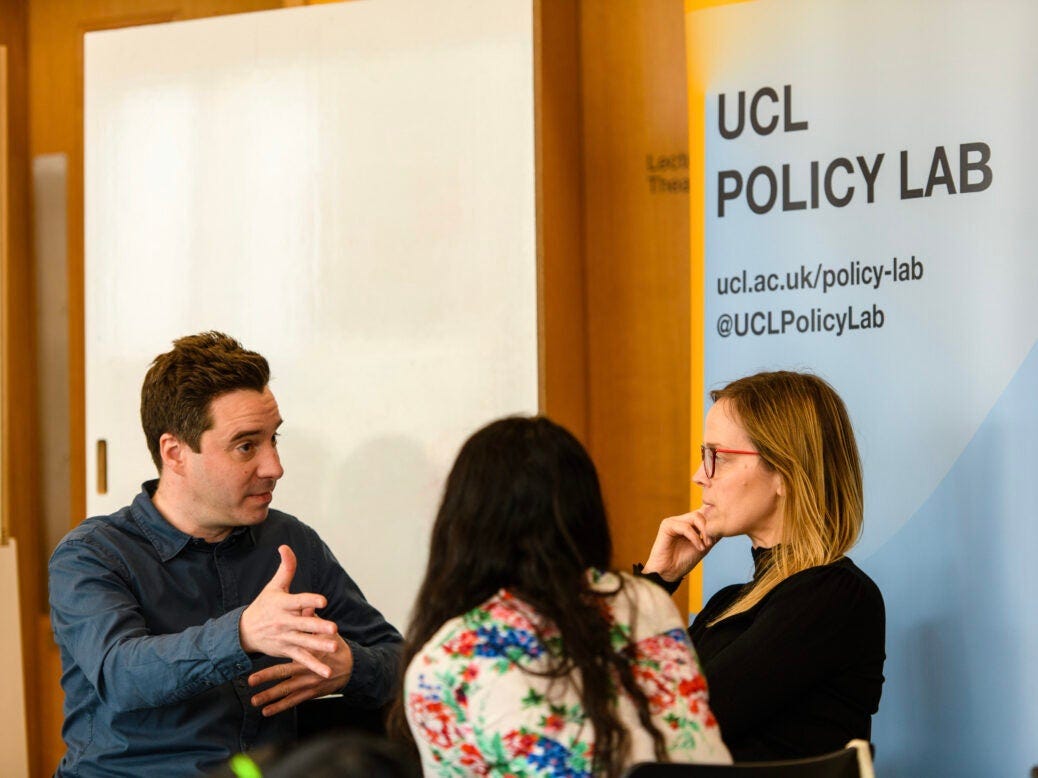Good morning. The consequences of the Budget are still working their way through British politics. Has it forced Labour into supporting spending cuts? Some thoughts below.
Then for our paid-tier subscribers: an extended piece today, from George on the first Starmerite think tank; then Ben looks at what Lee Anderson’s defection to Reform means in his Ashfield constituency; and I recommend some dystopian novels.
You can get the full-fat Morning Call by clicking this button. Thanks to Elena and everyone who subscribed over the weekend.
Within hours of the Budget, it was clear that Labour had a problem. How would the party fund the policies its non-dom tax abolishment was going to pay for now that the government had used the money to pay for tax cuts? Labour ruled out further tax raises. It also stood by the policies, which include school breakfast clubs, more nurses and MRI scanners. That leaves only one option: moving money from one area to another – in other words, spending cuts.
Rachel Reeves has said she will go through the government’s expenditure to find the £2bn she needs. Relatively speaking, this is pennies, and we shouldn’t overstate how important this is to Labour’s plans for office. But it reveals her priorities: Reeves would rather cut spending than raise taxes or borrow more money.
That’s before the election, anyway. Reality might intervene afterwards. Reeves suggested yesterday that she would not bail out the growing number of bankrupt councils, for instance. Is that true? Councils are responsible for many of the services that define people’s interaction with the state. Is Labour going to let bins pile high in the streets, libraries close, arts funding end? How will Labour claim to be the party of devolution when councils cannot provide basic services?
Then there is the national government’s financial quandary. That Reeves leant into spending cuts when she spoke to Laura Kuenssberg yesterday suggests that Labour might follow through with the Tories’ planned departmental cuts next year. Under current forecasts, unprotected departments could face real-terms cuts of about 3.4 per cent a year. Given the dire state of unprotected areas such as prisons, this could be undeliverable – but Labour is not making that argument now. If it did follow through, that would be the death of its slogan “invest to save”.
This grim prospect suggests Labour is determined to get its excuses in early, and convince the public that because of the economy it will inherit change will not come fast. Some sources I spoke to last week think this is key to avoiding a swift backlash in popular opinion in a Labour government’s first few months in office. Reeves will hope that economic growth means she won’t need to choose between further spending cuts, raising taxes and borrowing. What, though, if her gamble does not pay off?
Freddie’s picks
Rachel has written an interesting interview with John Hayes, godfather of the Tory right and mentor to Suella Braverman. Hayes, a Burkean, working-class Tory with a 31,000-vote majority, could be pivotal in the fight for the party to come.
Oppenheimer won seven Oscars last night, including Best Picture, Best Director and Best Actor. But is Christopher Nolan’s film Oppenheimer an accurate portrayal of the father of the atomic bomb? Ray Monk, who spent 11 years writing J Robert Oppenheimer’s biography, thinks not. Here’s why.
Meanwhile, Emma Stone won Best Actress for Poor Things. Pippa looks at how Stone went from rom-com everywoman to Oscar winner.
Theatre seems to be having a political renaissance. Andrew enjoyed Nye, a new play in which Michael Sheen stars as the NHS creator Aneurin Bevan.
Uncover insights from Lowell’s Financial Vulnerability Index
An unprecedented third of UK adults now have less than £500 in emergency savings, leaving them alarmingly exposed to financial shocks. Delve into the latest insights, drawing on anonymised data from 9million Lowell accounts to scrutinise the UK's financial resilience. Discover the findings here.
A think tank for the age of Starmer
On the evening of 27 February, at The Lighthouse Building in King’s Cross, central London, a selection of those shaping Britain’s future assembled: Labour Party aides, centre-left think tank heads, permanent secretaries and charity leaders. You could call it Starmerism in one room.
They were there for the launch of Ordinary Hope, a collection of essays, articles and interviews based on a collaboration between the two-year-old UCL Policy Lab and the 120-year-old Joseph Rowntree Foundation (JRF). Keir Starmer’s director of policy Stuart Ingham, his senior adviser Peter Hyman and two incoming aides, Harvey Redgrave of the Tony Blair Institute and Graeme Cooke of the JRF, were among those present (fittingly, in Starmer’s own Holborn and St Pancras constituency). So too were the former Labour cabinet minister James Purnell and Starmer’s biographer Tom Baldwin, both members of the Ordinary Hope project. But the gathering stretched beyond traditional party lines.
Click through to the NS to read the rest, or MC subscribers can read in full in-email.
Keep reading with a 7-day free trial
Subscribe to Morning Call to keep reading this post and get 7 days of free access to the full post archives.











